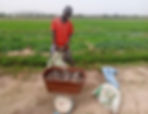AICCRA: The transformative power of climate smart agriculture
- adiomande9
- Apr 9, 2025
- 2 min read

Mali is a landlocked country in the Sahel region of West Africa, where rainfed farming provides food and income for more than two-thirds of the population of nearly 21 million people. Highly variable rainfall patterns, droughts, and shorter growing seasons pose major challenges to food production, nutrition, and the livelihood of smallholder farmers. It also increases the likelihood of violent conflict, which Mali has suffered to varying degrees since early 2012.
The Accelerating Impacts of CGIAR Climate Research for Africa (AICCRA) project funded by the World Bank has made significant strides in enhancing climate resilience through climate smart agriculture and climate information services, benefiting over 310,000 farmers across Mali. Key innovations, including the delivery of climate information through digital platforms, the promotion of drought-tolerant rice varieties, the RiceAdvice app for precision fertilization, the Smart-Valleys, and integrated rice-fish systems have directly contributed to improved agricultural productivity, higher incomes, and enhanced food security. The scaling mechanisms employed by the Mali cluster include demonstration plots, farmer field schools, digital advisory platforms, capacity-building programs, and partnerships with Niger Office, Mali-Meteo, Syngenta Foundation, IER and AMACIC NGO.
The impact of these interventions is evident across different user groups. Farmers using climate information services saw a significant increase in annual rice yield (2,363 kg/ha), with a corresponding income increase of 640 USD/ha. Drought-tolerant rice farmers achieved a 1,280 kg/ha annual yield increase, with a 262 USD/ha. Users of the RiceAdvice app experienced a 992 kg/ha annual yield increase and 202 USD/ha income increase. The increased food consumption scores across these groups further highlight the broader impact on food security.

The project also promoted diversification through rice-fish systems in vulnerable regions such as Sikasso, Ségou, and Koulikoro. This approach, implemented without any fertilizer use, achieved rice yields comparable to those obtained with recommended fertilizer application, while generating an additional annual income of USD 1,319/ha. Furthermore, the GEM parboiling technology, which benefited 250 women, provided climate-friendly rice processing techniques that boosted nutritional quality and annual household income by 37 USD/ton of rice.
These outcomes demonstrate the transformative power of climate smart agriculture and climate information services in improving climate resilience, agricultural productivity, and livelihoods in Mali. The project not only enhanced rice landscapes resilience to climate change but also empowered women and men by providing them with the tools and knowledge to adapt. By addressing gender-specific needs and promoting climate-smart strategies, these interventions have successfully laid the foundation for sustainable and climate resilient agricultural development in Mali.









